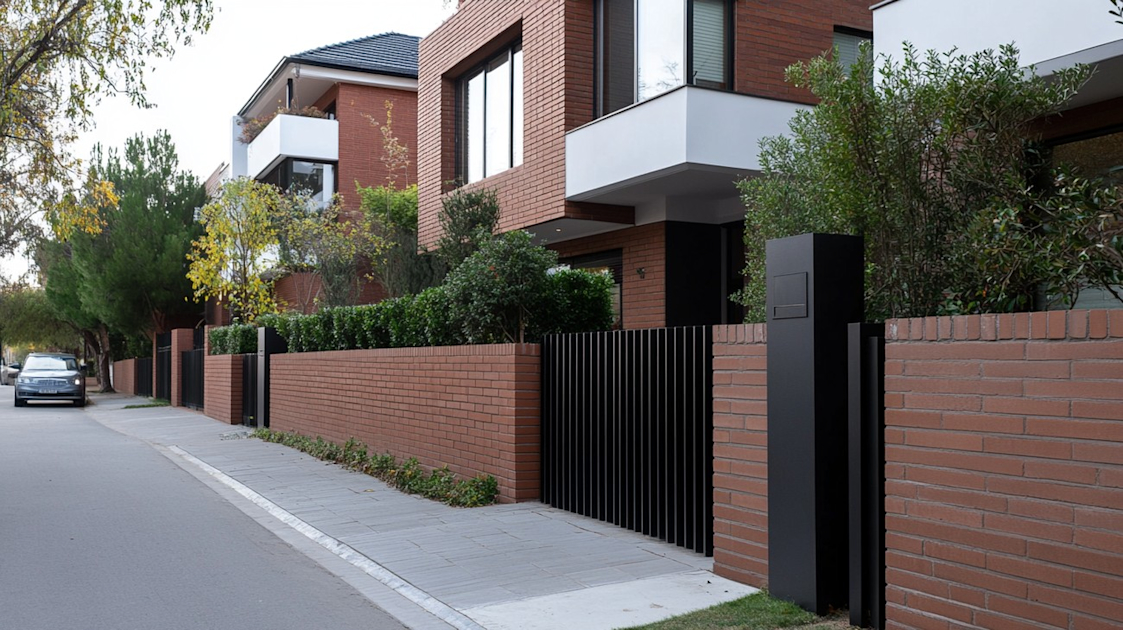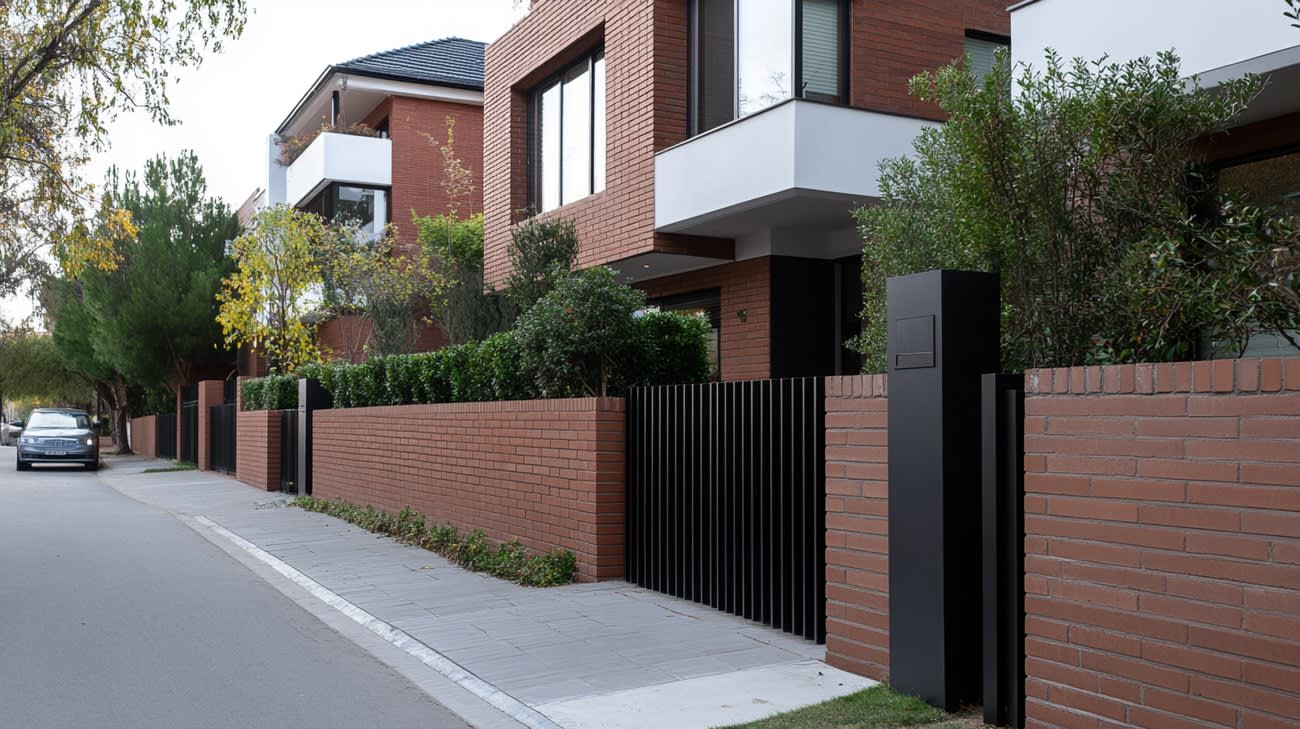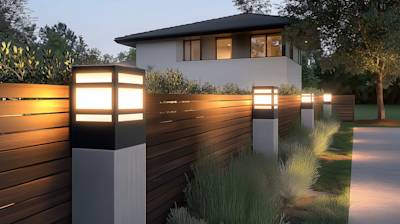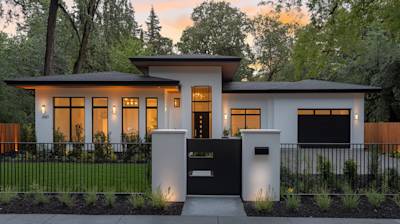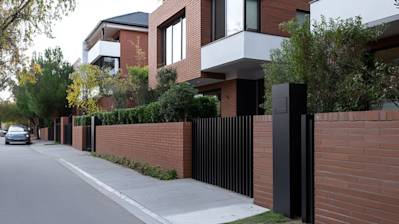Brick fences have been a hallmark of sturdiness and aesthetic appeal for centuries. They serve as a protective wall and add charm to the property which they surround. In this blog post, we will delve into the world of brick fences, outlining their benefits, types, construction methods, and maintenance tips.
Benefits of Brick Fences
First on the agenda is understanding why brick fences are such a popular choice:
- Durability: A primary reason property owners opt for brick fences is their durable nature. They stand up to the test of time, resisting harsh weather conditions and wear and tear.
- Security: Brick fences serve as excellent barriers, providing optimal security from trespassers.
- Sound Insulation: Brick fences efficiently block out noise from traffic and other external sources, providing a peaceful environment within your house.
- Visual Appeal: Brick fences are a visually attractive addition to any property, and they can easily complement various architectural styles.
- Low Maintenance: The maintenance routine for brick fences isn't complex or onerous. They can retain their appearance over the years with minimal upkeep.
Types of Brick Fences
When it comes to brick fences, there are numerous styles to choose from, each lending a distinct visual element to your property:
- Traditional Brick Wall: These sturdy brick fences typically have a uniform look, making them classic and timeless.
- Interlocking Block Fence: These modern brick fences are built with specifically engineered bricks that interlock for an easy and efficient installation.
- Picket Fence with Brick Columns: This design incorporates brick pillars with wooden planks to bestow an elegant look to your home.
- Iron and Brick Fence: The combination of iron grills and brick columns offer a contemporary vibe and improved visibility across the fence.
Constructing a Brick Fence
While constructing a brick fence is a hefty task, it's a rewarding one with the right steps:
- Plan and Design: Initially, list down your requirements and design your fence accordingly. You’ll need to account for the height, thickness, and length of the fence along with the design of the brick pattern.
- Gather Materials: Gather all required materials such as bricks, mortar, and fence posts. The number of bricks and the amount of mortar required will depend on the fence's dimensions.
- Prepare the Ground: The next step is to prepare the ground by digging a trench and installing footings. The trench should be proportionate with your fence's height.
- Laying the Bricks: Lay the bricks one by one, applying mortar on each layer. You will continue this process until the desired height is reached.
- Apply Finishing Touches: Once the bricks are laid, check for any gaps between bricks and fill them with mortar. Then, polish the outer surface of the fence to complete the job.
Maintenance Tips for Brick Fences
- Regularly clean the fence with a mild detergent and water. Avoid using harsh chemicals that may damage the bricks.
- Inspect the fence from time to time for cracks and repair promptly to avoid further damage.
- Repaint or seal the fence every few years to retain its aesthetic appeal.
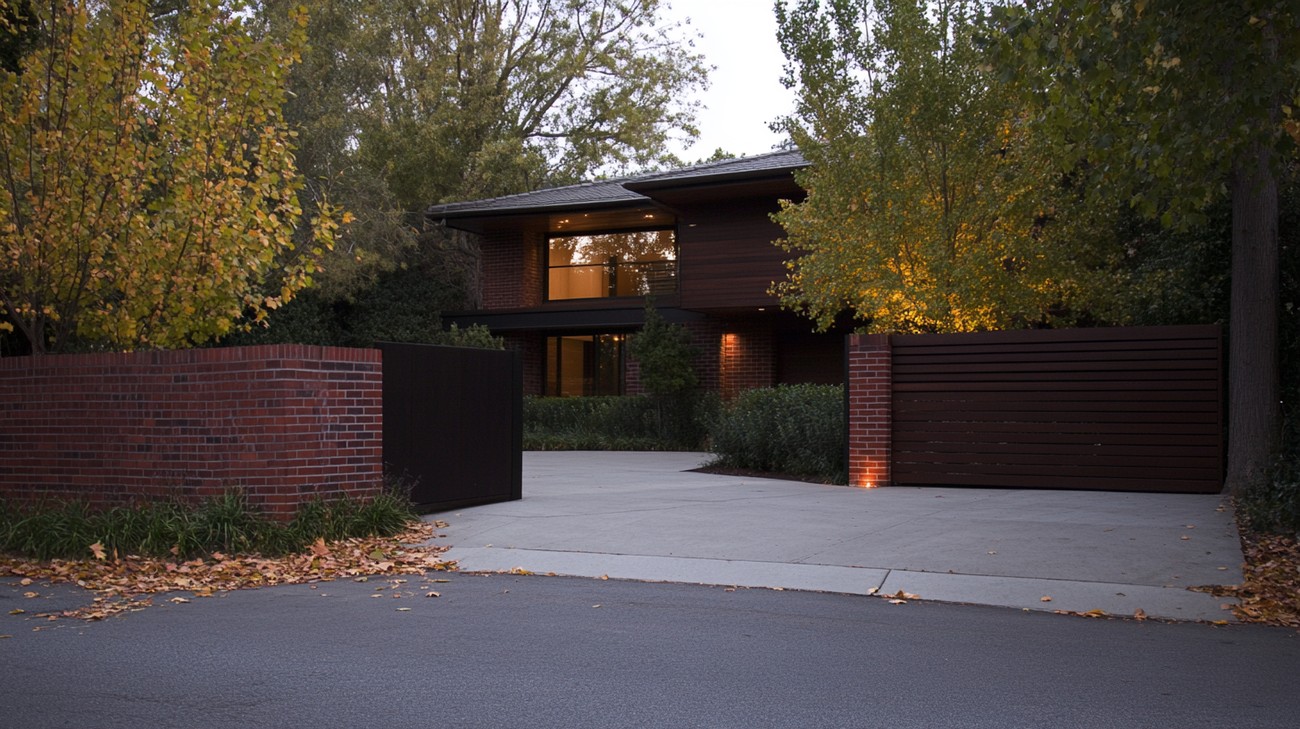
Frequently Asked Questions about Brick Fence
How long does it take to build a brick fence?
The time it takes to construct a brick fence relies on several factors, such as the length and height of the fence, weather conditions, availability of materials, and whether you're doing it yourself or hiring a professional. Generally, the process could take anywhere from a few days to few weeks.
How much do brick fences cost?
The cost of a brick fence can vary significantly depending on certain factors. For example, the size of the fence, the type of bricks used, and the complexity of the fence design can contribute to the overall cost. As an estimate, a professionally installed brick fence can range from $15 to $75 per linear foot.
How long can a brick fence last?
With proper maintenance and care, a brick fence can last a lifetime. Brick is a durable material that withstands extreme weather conditions better than many other fencing materials. However, factors such as the quality of the brick, construction technique, and local climate can affect its longevity.
Do I need a permit to build a brick fence?
Most likely, yes. Anything structural normally requires a permit in most areas, and fences are no exception. The exact regulations can vary by location, so it would be best to contact your local council or building department for accurate information. Be sure to get this sorted before starting construction to avoid any potential legal issues down the line.
How are brick fences maintained?
Maintenance for brick fences is relatively straightforward. The bricks can be cleaned using a bucket of soapy water and a stiff brush. Also, if your brick fence is painted, keep an eye out for any paint chips or cracks. Applying a fresh coat of paint when necessary will keep your fence looking fresh and new.
Can brick fences be painted?
Yes, they can. Painting a brick fence can give it a new look and even provide an extra layer of protection against the elements. Before you go ahead and paint, though, make sure your bricks aren't already sealed. If they're sealed, you'll need to strip this off first. Furthermore, choose an outdoor paint specifically designed for brick.
Are brick fences eco-friendly?
Brick fences can be considered eco-friendly because bricks are made from some of the earth's most abundant materials: clay and shale. Plus, bricks are durable, require little maintenance, and have a long lifespan, reducing their environmental impact over time. However, the manufacturing process can be energy-intensive, which is something to be aware of.
What are some suitable alternatives to brick fences?
If a brick fence isn't for you, fear not - there are plenty of alternatives to consider. Some suitable alternatives to brick fences include wooden fences, metal fences, vinyl fences, and composite fences. Each of these has its unique benefits and drawbacks, so you'll need to weigh these up to see which is the best fit for you.

Pros of a Brick Fence
Durability
Resistant to Elements
One of the biggest advantages of a brick fence is its durability. Brick fences can withstand the elements and keep standing tall for many years. The bricks are resistant to rain, wind, and snow, making them an excellent choice for fence material in harsh weather climates.
Fire Resistant
Unlike wooden fences, brick fences are not flammable, meaning they can be a safer option if you live in an area susceptible to wildfires or close to structures that pose a fire risk.
Maintenance
Minimal Upkeep
Brick fences require minimal upkeep once they are installed. Unlike wood fences, they do not need to be repainted or re-stained over time. Even in terms of cleaning, a simple rinse with a garden hose or a quick scrub with mild detergent is usually enough to make your brick fence look as good as new.
Pest Resistant
Bricks are impervious to pests, which is a huge pro for homeowners. Unlike wooden fences, brick fences will not be damaged or destroyed by termite infestations or other common pests.
Aesthetic Appeal
Timeless and Stylish
Brick fences have a timeless aesthetic appeal that can perfectly complement the exterior of any home or landscape. They add a touch of elegance and sophistication to a property and can be customized in color, design, and texture according to individual tastes.
Increased Property Value
Brick fences not only add an aesthetic appeal to your home, but they also increase your property's value. Because they are long-lasting and require minimal maintenance, potential buyers may be more eager to acquire a property with a brick fence installed.
Cons of a Brick Fence
Cost
High Initial Expense
The most glaring disadvantage of installing a brick fence is the high initial cost. Brick fences are significantly more expensive than most other fencing materials. The high cost includes not only the price of the bricks themselves but also the labor for installation.
Installation
Time-consuming
Installing a brick fence is a lengthy and involved process compared to other types of fences. Given the weight and unwieldiness of bricks, a significant amount of time and skill is required in constructing a brick fence, especially one that's meant to be both robust and aesthetically pleasing.
Requires Professional Installation
Brick fences almost always require professional installation, which adds to the overall cost. Unless you're an experienced mason, attempting to build a brick fence by yourself could result in a less than sturdy structure.
Climate Considerations
Less Adaptive to Changing Soil Conditions
Brick fences can be less adaptive to shifting soil conditions compared to some other types of fences. In areas where the ground freezes and thaws, this could eventually lead to a destabilized or misaligned fence.
Fading
Over time, bricks can fade due to constant exposure to sun and other elements. This may slightly alter the original look of the fence and negates some of the beautifying factors that prompt many homeowners to choose brick in the first place.
Difficult to Modify
Once a brick fence is installed, it can be challenging to make modifications, such as changing the fence's height or layout without considerable time and expense. This makes it less flexible than some other fencing options should your needs change over time.
Myths and Misconceptions About Brick Fences
In the world of home improvement and landscaping, brick fences are often seen as an elegant and long-lasting choice. However, there are many misconceptions about the nature of brick fences, how they're constructed and maintained, and what makes them the right choice for certain properties.
Myth 1: Brick Fences are Expensive
A common misconception is that brick fences are significantly more expensive to construct than wooden or chain-link fences. While the material cost of bricks is higher than that of wood or chain-link, the overall cost is quite comparable when considering the longevity and durability of brick fences. Bricks do not decay, warp or rust, which often leads to significant savings over time by reducing maintenance and replacement costs.
Myth 2: Brick Fences are Maintenance-Heavy
With the right care and attention, a brick fence is no harder to maintain than your average wooden or metal fence. Regular inspections for signs of wear and tear, such as cracks, chips, or loose mortar will help catch any minor issues before they become big problems. Essential maintenance tasks are quite straightforward, often involving only cleaning off dirt or moss and reapplying the occasional bit of mortar.
Myth 3: All Bricks are Alike
When it comes to choosing bricks for a fence, not all bricks are created equal. Different types of bricks can vary significantly in terms of their color, texture, strength, and weather-resistant properties. For instance, clay bricks are extremely durable and resistant to weathering, whereas concrete bricks may offer a wider range of attractive color options.
Myth 4: Brick Fences are Only for Traditional Homes
While brick fences are certainly common in traditional or historic homes, they are not restricted to these styles. In fact, brick fences can add a touch of elegance and refinement to almost any style of home, whether it's a modern minimalist house, a ranch style bungalow or concrete apartment blocks. The key lies in selecting the right style of brick and combining it with appropriate landscaping features.
Myth 5: Brick Fences Decrease Property Value
This myth likely originates from the belief that brick fencing gives a property a “closed-off” feel, potentially discouraging prospective buyers. In reality, the opposite is often true. A well-designed and well-maintained brick fence can add significant curb appeal to a property, effectively increasing its market value. In addition, it can provide a greater sense of privacy and security, which are valuable attributes to many homebuyers.
Myth 6: Brick Fences are not Eco-Friendly
While the production of bricks does involve high-temperature kilns and can contribute to CO2 emissions, this doesn't mean that brick fences are inherently non-eco-friendly. Many brick manufacturers are adopting more sustainable business practices, such as reclaiming and recycling old bricks. Also, the longevity of bricks means less frequent need for replacement, therefore reducing the total environmental impact over time.
Myth 7: Brick Fences Block All Sound
Although brick fences do provide a certain measure of sound proofing, they are not capable of blocking all outside noise - another common misconception. The degree of sound dampening provided by a brick fence depends on several factors, including the height and thickness of the fence, the type of brick used, and the proximity of the noise source. Nevertheless, brick fences can effectively reduce road noise or the sounds of noisy neighbors to a considerable extent.
Myth 8: Brick Fences Take a Long Time to Build
The time it takes to build a brick fence largely depends on its size and complexity. Sure, brick fencing requires more time to construct than a basic wooden, vinyl or chain-link fence, but the process is typically streamlined by professionals who have mastered the craft. Moreover, the time investment can be well worth the attractive aesthetic and long-term durability that a brick fence offers.
Each of these misconceptions about brick fences offers an opportunity to understand this home improvement option better. While some beliefs hold a grain of truth, many are unfounded, and considering them can unnecessarily limit your landscaping choices. As always, the best approach is to consult with a professional to determine which fencing material and design best suits your individual circumstance and preference.
Summary
So, there you have it. If you are pondering over different options for a classic and-durable fence for your property, you might want to consider the charm and strength a brick fence can offer. They add a level of sophistication to your exterior design while providing ample personal space and security. Just remember, due to their permanence and strength, carefully consider their placement and design before construction begins.
This brings us to the end of our talk about brick fences. Whether it's for a residential property or a commercial one, a brick fence never fails to blend aesthetic appeal and practicality. They are robust, resistant to severe weather conditions, and most importantly, they provide utmost privacy. However, they need regular maintenance to retain their beauty and function, so keep that in mind before opting for this type.
Wrapping up, the enduring appeal of a brick fence is what sets it apart from other types of fences. It's more than just an enclosure; it's an extension of your home that speaks volumes about your personality and taste. It may require a higher initial investment, but people who have it would argue that it's worth every penny. So, if you value elegance, durability, and low maintenance, then a brick fence might be the right fit for you.
About Ornamental Solutions
Ornamental Solutions, based in the charming heart of Sacramento, CA, is your one-stop destination for all your decorative needs. We’re a homegrown, passionate team, bringing you the perfect blend of traditional craftsmanship and contemporary design. Since our inception, we've been transforming spaces into artistic masterpieces, infusing them with our creative, ornamental, and abstract ideas. Trust us, you'll be wowed by our wide catalogue of stunning finishings, ornate metal works, hand-crafted items, and unique accents. We're here to bring dazzling beauty to your environment and to win your heart through our work!

